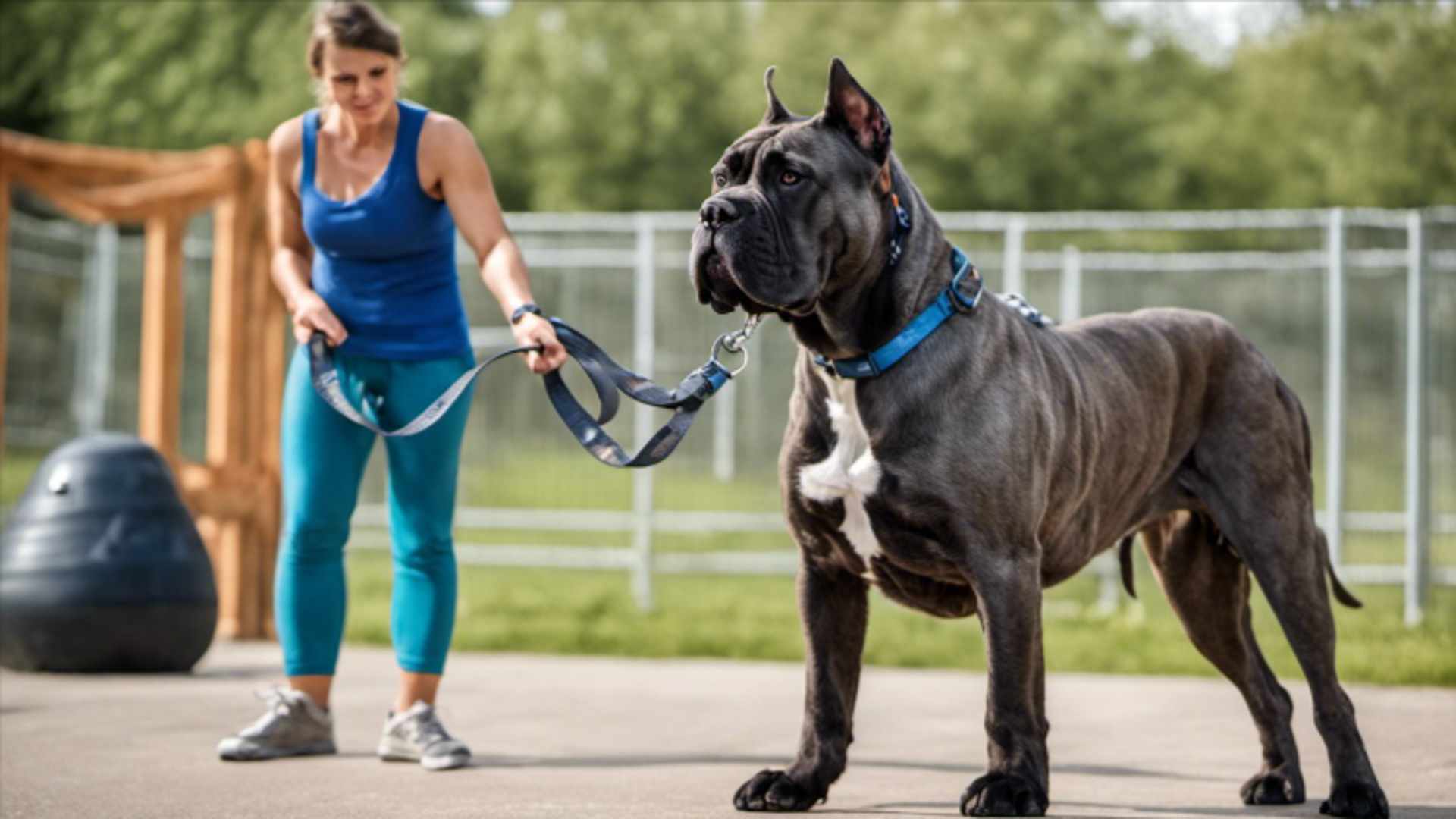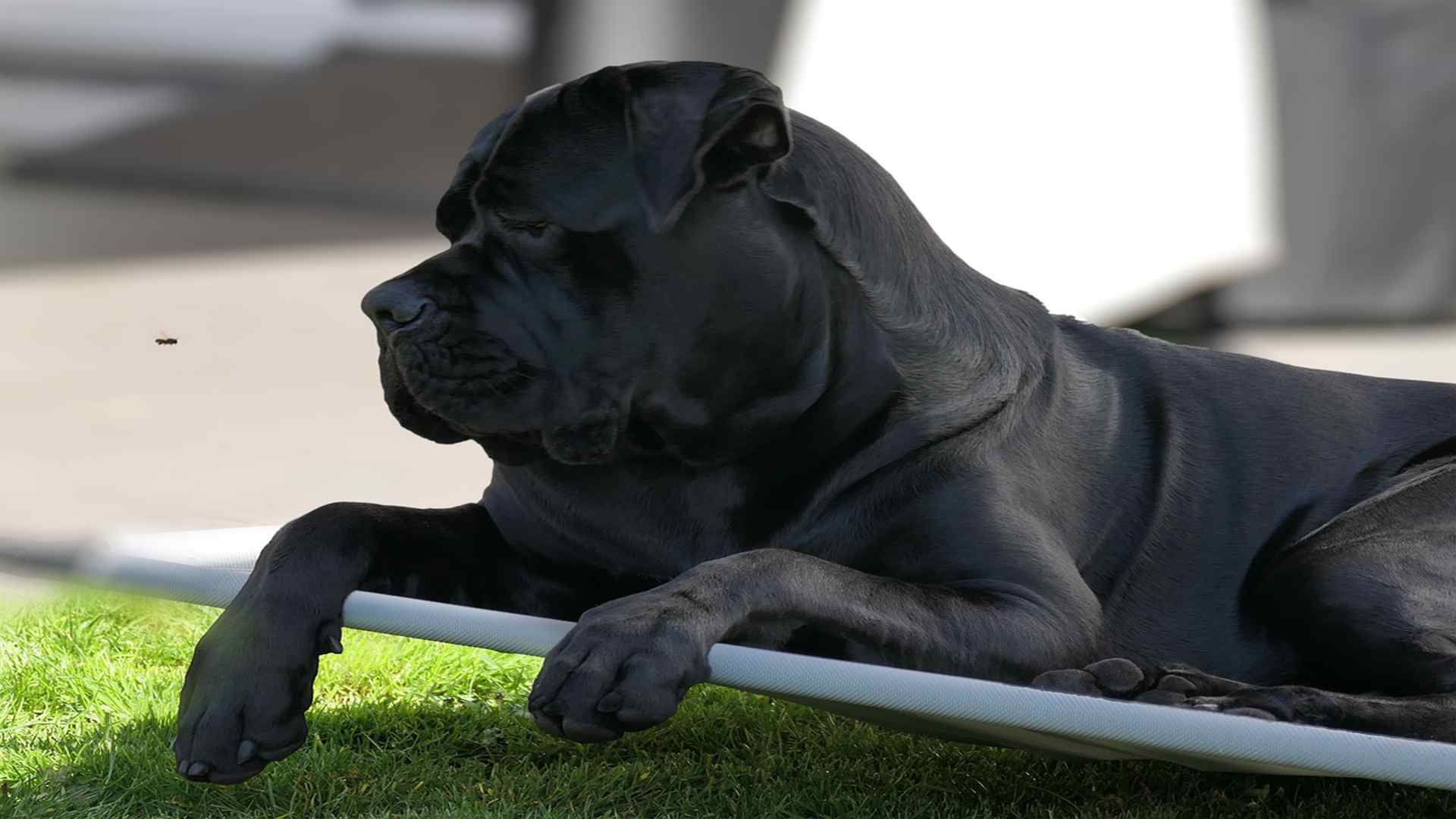As a dog owner, I understand the challenges that come with training a Cane Corso to stop barking.
These powerful, intelligent dogs, known for their guarding instincts, have a natural tendency to bark. However, excessive barking can become an issue if not addressed properly.
In this article, I’ll discuss a few effective strategies for reducing your Cane Corso’s barking behavior so that you can have a peaceful home.
Let’s begin!
Understanding Cane Corso barking
Before attempting to stop your Cane Corso from barking, it is important to understand why they bark in the first place. Generally speaking, dogs bark as a way of communicating with us and other animals.
It can signal that they are excited, scared, angry, or anxious. Knowing what triggers your dog’s barking can help you better address the problem.
Breed traits and behavior
Cane Corsos are natural guard dogs, and their loyalty is unsurpassed. They are highly protective of their territory and humans, which can influence their barking habits.
These strong, intelligent dogs are bred to defend their homes and families, so their barking is often a product of this instinct.
Cane Corsos typically bark when they perceive a potential threat or danger in their environment. While it’s essential that I understand my dog’s instincts, I also need to help my Cane Corso learn when it’s appropriate to bark and when it’s not!
So, over time, I’ve found a few solutions that have helped me to reduce my dog’s barking.
Communication
In order to effectively address my Cane Corso’s barking, I need to understand how these dogs communicate. Barking is not just noise; it is a form of communication.
For my Cane Corso, barking could indicate a variety of emotions and needs, including fear, anxiety, boredom, hunger, or simply a desire for my attention.
As a dog owner, I ought to pay attention to my Cane Corso’s body language and behavior to pinpoint what my dog is trying to communicate.
Understanding the contexts in which my Cane Corso barks will help me address any specific issues and stop the barking when necessary.
Triggers
Identifying specific triggers that cause my Cane Corso to bark is an important step in managing the behavior. Some common triggers for barking include:
- Strangers or unfamiliar animals approaching their territory.
- Loud noises or other disturbances, such as fireworks or thunderstorms.
- Separation anxiety when I’m away from home.
- Boredom, especially if my Cane Corso doesn’t receive enough physical and mental stimulation.
Remember, my goal is not to eliminate barking entirely, as it is a natural form of communication for my dog. Rather, I want to ensure that my Cane Corso’s barking is appropriate and manageable in any situation.
Read also: Do Shock Collars Work on Cane Corso? (Let’s Find Out)
How do you stop your Cane Corso from barking at people?
I’ve had my fair share of dealing with barking issues. In my experience, these effective methods can help you train your Cane Corso to stop barking on command:
1. Using the ‘quiet’ command
When I first started training my Cane Corso, I found the ‘quiet’ command to be an essential tool. To teach the command, I followed these steps:
- Wait for my dog to start barking, then say “quiet” in a firm and calm voice.
- If my dog stopped barking, I quickly rewarded them with praises or treats.
- If my dog continued barking, I repeated the command while maintaining a calm and assertive demeanor, then rewarded them once the barking ceased.
It might take some patience, but eventually, your Cane Corso will understand the connection between the command and desired behavior.
2. Positive reinforcement and rewards
I’ve learned that positive reinforcement is a powerful ally in training my Cane Corso. When teaching them to stop barking, I always praise and reward them for their good behavior. Here’s what I do to make positive reinforcement work:
- As soon as my Cane Corso stops barking, I give them a treat or praise.
- I vary the rewards so my dog doesn’t become too accustomed to one type of treat.
- I gradually decrease the frequency of rewards, allowing my dog to learn that the absence of barking is a positive thing.
Remember, consistency is key to making the positive reinforcement method work.
3. Ignoring unwanted barking
In some cases, ignoring unwanted barking has been an effective strategy for me. Here’s my approach:
- When my Cane Corso barks for no apparent reason, I resist the urge to correct them or pay attention.
- Once they stop barking, I wait for a few seconds to make sure that their silence is intentional and not a mere pause.
- After confirming the deliberate silence, I calmly praise and reward my dog to reinforce the desired behavior.
Keep in mind that ignoring unwanted barking could take some time and patience, but it sends a clear message to your Cane Corso that barking without reason will not be tolerated.
Read also: Cane Corso Intelligence: How Smart Are They? ([year])
Socialization
This is one of the most important tips I can give to any Cane Corso owner. If you just got a new puppy, the first few months of life are critical for successful socialization. Let’s see how this can help with barking.
Introducing new people and environments
One of the key steps to prevent a Cane Corso from barking excessively is through proper socialization.
When I got my puppy, I began by exposing my dog to various people, animals, and environments, making certain that each experience was positive.
Visiting parks and busy streets and attending dog training classes are all excellent opportunities for this.
Addressing excessive barking
When it comes to addressing excessive barking, consistency is key.
Identifying the causes
First things first. Identify the causes of your dog’s excessive barking. Triggers or stimuli can lead to reactive barking, while territorial behavior may also be a factor. One possibility could be a lack of socialization or underlying medical issues. Keeping a record of what leads to the barking will help you pinpoint the root cause.
Implementing strategies
Once I’ve identified the causes of excessive barking, I can implement strategies to reduce it. Here are a few measures I can take:
- Provide adequate exercise. Cane Corsos are a high-energy breed and need regular exercise. Ensuring the dog gets sufficient physical and mental stimulation can help alleviate unwanted behaviors like excessive barking.
- Desensitize to triggers. Gradually expose my cane corso to the stimuli causing the barking while rewarding them for remaining calm. This will help them develop a positive association with the previously triggering situation.
- Avoid unintentional reinforcement: Sometimes, can happen that I may accidentally encourage my dog’s barking by giving them attention when they bark. By ignoring the unwanted behavior, I can help break the cycle of reinforcement.
- Consult a professional: If the barking persists despite all the efforts, seeking guidance from a veterinarian or professional dog trainer is a good next step. They can offer additional insights and tailored solutions to address my dog’s specific needs.
Read also: Are Cane Corso Good Apartment Dogs? An Owner Explains
Managing separation anxiety
Managing separation anxiety is crucial in reducing excessive barking in a Cane Corso. I have experienced that creating a calm and predictable environment for my dog helps alleviate their anxiety when I am away.
First, I establish a consistent routine for my Cane Corso. Regular feeding, walking, and playtimes allow my dog to predict my daily schedule and decrease their stress.
Before leaving, I make sure to give my Cane Corso plenty of physical activity. A tired dog is less likely to experience separation anxiety and excessive barking. I also provide them with interactive toys and puzzle feeders to keep them occupied while I am gone.
Gradually increasing the time spent apart is another important technique I use. I begin by leaving my dog alone for short periods and then slowly extend the duration. This helps my dog get used to being alone and prevents panic.
Using positive reinforcement when I return home is an effective way of assuring my Cane Corso that everything is okay. However, I avoid excessive excitement and instead provide calm and comforting praise.
Lastly, I create a designated area in my home for my dog where they feel secure and comfortable when I am away. Having a recognizable space with their toys and bed helps to support a sense of safety and familiarity.
Creating a stimulating environment
These massive dogs need a lot of mental and physical stimulation to prevent boredom. There are a variety of ways to keep your Cane Corso occupied; this is also what I do! So let’s see what I use to keep my Cane Corso entertained.
Physical activity and exercise
I believe a well-exercised Cane Corso is less likely to resort to excessive barking. As an owner, I make sure to provide my Cane Corso with plenty of physical activities like daily walks, hikes, and playing fetch to help release built-up energy.
I often mix it up to maintain excitement and avoid boredom.
- Daily walks. I walk my Cane Corso for at least 30-45 minutes twice a day.
- Hikes. I occasionally take my dog on hikes, ensuring the trails are suitable for their size and strength.
- Fetch. I engage in games like fetch using various toys; this exercises not only the body but also the mind.
Professional help and training resources
Sometimes, the issue of excessive barking, despite all our efforts, cannot be resolved without professional help. In such cases, I seek guidance from a veterinarian or certified dog trainer to identify the root of the problem and offer tailored solutions.
Working with a professional trainer
I believe that working with a professional trainer is one of the best options for any dog owner since a trainer can provide personalized solutions to address the specific needs of your Cane Corso.
I like to look for a trainer who specializes in working with large breeds and offers positive reinforcement-based methods. They help my dog learn how to respond appropriately to situations that cause excessive barking without using punishment or intimidation tactics.
Here’s a certified dog trainer consultancy I’ve used in the past and can highly recommend.
Take your time to research a dog trainer, as this can be a tedious process. It’s always important to interview the trainer and ensure they offer the services you need.
Online training courses
Online training resources are another great option that I often use. They provide helpful tips to owners who may not have the time or financial resources for one-on-one training sessions.
One example is K9 Institute’s Dog Masterclass, which offers comprehensive training courses for various dog breeds, including Cane Corsos. These programs can provide me with valuable insights into breed-specific concerns and techniques to address them effectively.
Accessing these online training resources gives me the flexibility to learn at my own pace and apply the techniques best suited for my Cane Corso’s temperament and needs.
Moreover, many of these courses also provide support from professional trainers who can address any questions or concerns I may have along the way.
Taking action
Implementing change through action is crucial for progress.
While acquiring knowledge and information through reading is valuable, the key to success is taking action on that knowledge. To assist you in applying what you have learned from this article, consider the following points:
- Identify triggers that cause your dog to bark.
- Avoid unintentional reinforcement of your Cane Corso’s barking by not providing rewards or attention when they bark. Instead, reward them with positive reinforcement for being quiet.
- Create a stimulating environment for your Cane Corso to prevent boredom. This includes providing plenty of physical activity, interactive games, and mental stimulation toys.
- Work with a professional trainer or use online training courses like K9 Institute’s Dog Masterclass.
Conclusion
I have discussed various methods to stop a Cane Corso from barking. Training and socialization play a crucial role in controlling excessive barking.
By using tools like positive reinforcement and the ‘quiet’ command, you can teach your Cane Corso to obey and stop barking at commands.
Furthermore, providing your Cane Corso with enough mental and physical stimulation helps channel their energy and reduce anxiety, which may lead to excessive barking. A well-exercised and engaged Cane Corso is less likely to bark excessively.
Lastly, addressing underlying issues, such as medical conditions or environmental factors, can ensure that your Cane Corso’s barking is not a symptom of an unresolved problem.
In essence, patience, dedication, and understanding are required to address your Cane Corso’s barking issue. Being confident, knowledgeable, and clear in your approach will assist you in achieving a more peaceful and harmonious coexistence with your furry friend.
Want to learn more about Cane Corso?
Ready to boost your knowledge to the next level? If so, check out the articles below:





